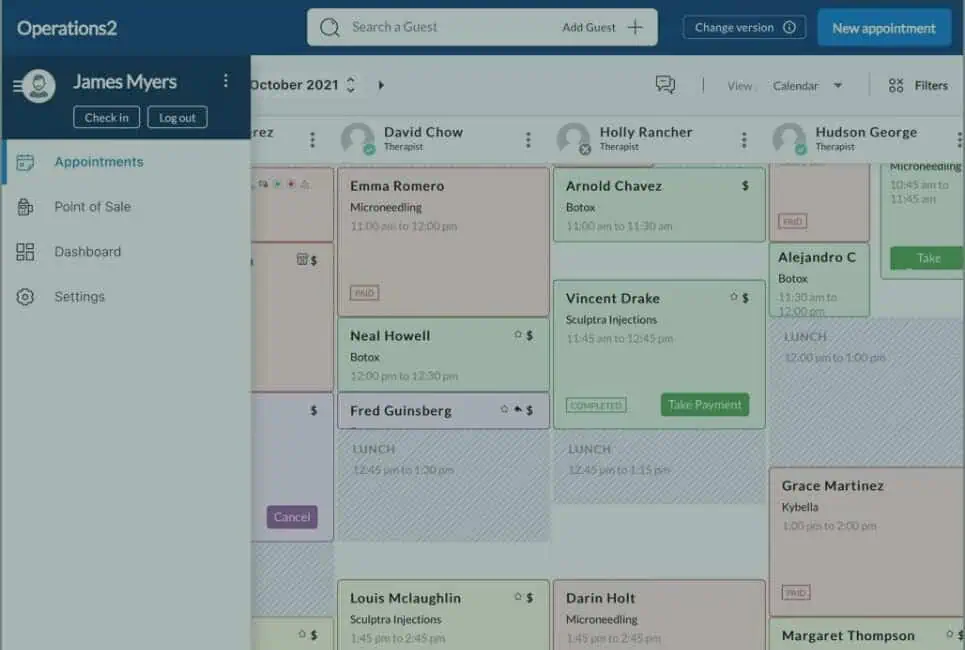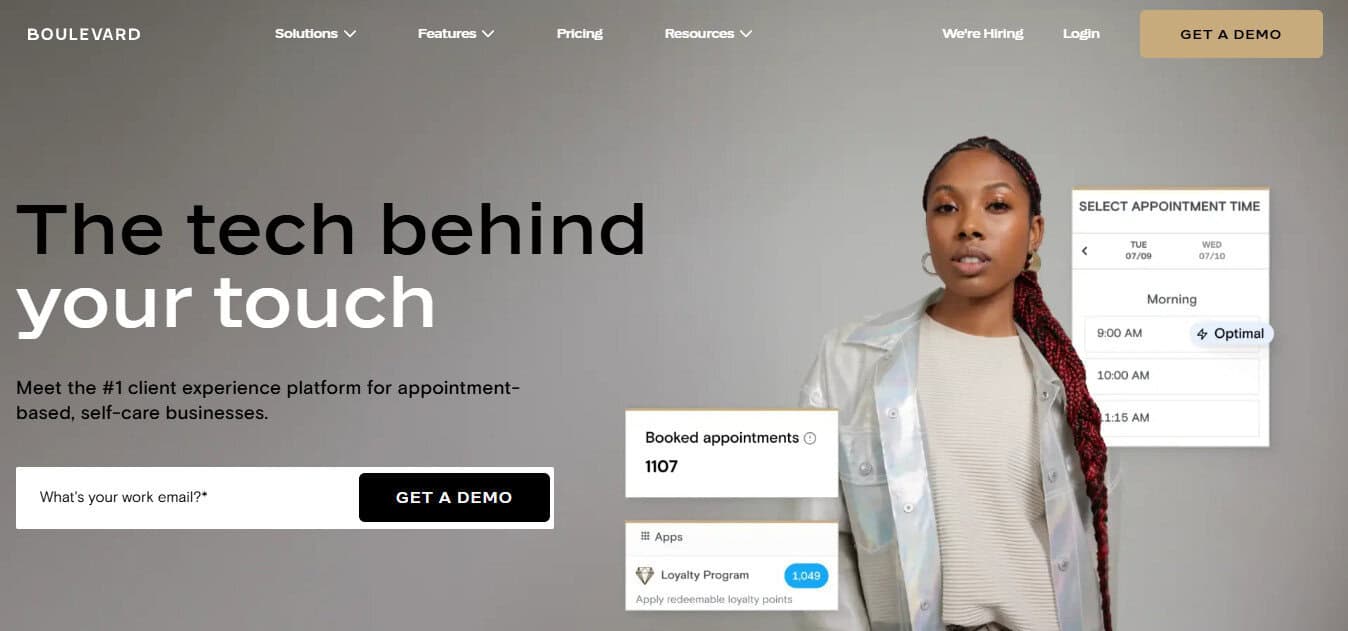Last Updated on June 23, 2025 by Ewen Finser
Zenoti is a platform best fit for international operations like those spas or health centers with locations in different locations/countries in need of a single platform for managing them all. There is a lot of potential with this particular platform and a lot of things to like about their availability, accessibility, languages, and internal reports.
Unfortunately, they are designed for large-scale operations, so if you don’t have hundreds of clients or half a dozen locations, you might be using a fraction of the platform and spending money unnecessarily.
So, having worked with multiple platforms in the past, I’m going to look at some top Zenoti alternatives to consider, especially for smaller businesses.
Boulevard was built for real stylists, salon, and spa owners. It handles booking, checkout, and smart scheduling the way busy salons actually work. It even handles marketing, from rebooking reminders to targeted emails and texts, plus it fills open spots with waitlist requests, without the scrambling.
Alternatives to Consider
All of the options below are great alternatives to Zenoti, each filling a particular need. Let’s look at them side by side to see when you should consider one as your alternative.
- Boulevard: Most comprehensive all-in-one solution
- Mindbody: Best for independent instructors and personal trainers
- Vagaro: Best visual reporting
- Acuity: Most budget-friendly option
Best Alternative
Up front, my favorite Zenoti alternative is Boulevard, especially for salons, spas, and medspas. It is effectively a streamlined alternative to Zenoti, doing away with the superfluous aspects for smaller to medium sized businesses and instead replacing them with a much easier to use platform.
Why You Might Need Zenoti Alternatives
As I mentioned above, Zenoti has so many things going for it despite the fact that the entire platform looks like it migrated from the MySpace era and belongs on Windows 98. However clunky and outdated the UI might be, it has a lot of great features particularly for managing multiple locations in different countries.
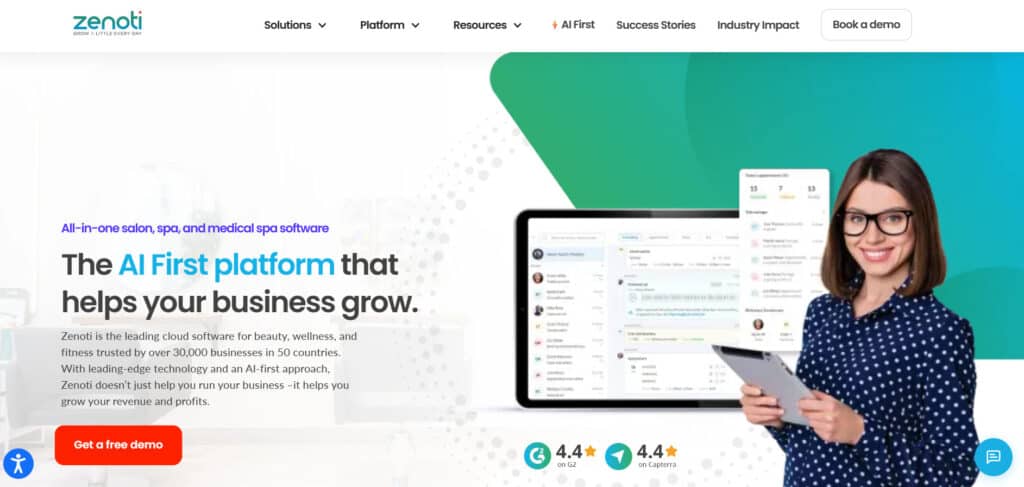
But it can be a bit much, and considerably more than most companies need. I worked with a small company that only had two locations in neighboring cities and Zenoti was just too big. It had so much going for it because of the accessibility and the language options, which we really liked, but it had a high price tag and we only ended up using about 25% of the features.
So, if your business is looking to save money with simplified core services, and you want to actually use all of the features that you’re paying for, it might be time to consider some alternatives.
My Zenoti Pain Points and How the Alternatives Can Help
#1: Pricing and Features
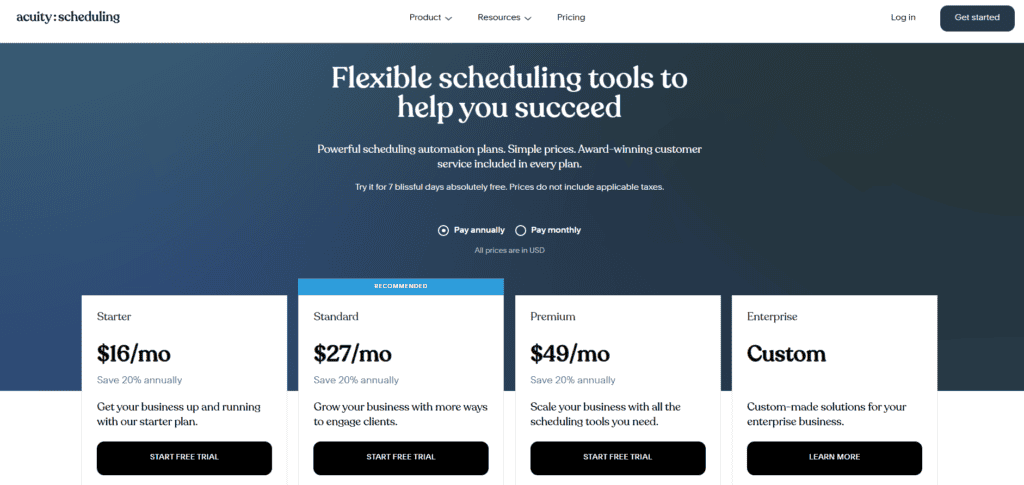
Zenoti is pretty expensive. Now, that’s because they offer a lot of features for large businesses but you are still paying over $400 per month and if you only have a couple of employees or you are an independent stylist, that’s way too much. So what are your alternatives?
- Mangomint: They don’t have a free version but they have a free trial. After that, there are three price levels based on the number of providers you have. Pricing starts at $165 per month and goes up to $375. Even the basic plan has calendar and booking features, mobile apps, reporting, payment options, and staff management options. You have to pay extra, though, for things like HIPAA compliance or a virtual waiting room.
- Acuity: Acuity is by far the cheapest, with an entry-level package at only $16 per month. They have four levels that increase in price but also increase in benefits.
- Vagaro: The pricing here it’s pretty affordable, with plans that start at $30 per month. From there, they charge you an extra $10 based on each additional employee but they max out at $90. The only downside is if you want any of the additional features that don’t come with a standard package, you have to pay for those à la carte.
- Boulevard: With Boulevard, there are a few plans available but you are looking at between $250 and $425 per month. To be clear though, that price is an all-inclusive price with every feature and service you might need and it doesn’t change based on the number of employees you have, the number of clients you add, or anything else.
- Mindbody: Pricing for basic subscriptions start at $99 per month per location but if you want things like new client commissions, API calls, or dynamic pricing, you’ll still see additional fees.
If you are absolutely looking for the cheapest option, one that still gives you basic tools of booking, client self-scheduling, and payment processing, Acuity it is, but if you want a single price without having to worry about multiple levels or a la carte features, go with Boulevard.
#2: User-Interface
When I briefly worked with Zenoti, it was like a time machine. Every time I had to use it I was suddenly transported to my high school entry level computer class, back before computer classes were a normal part of curriculum (before computers were even a normal part of school!)
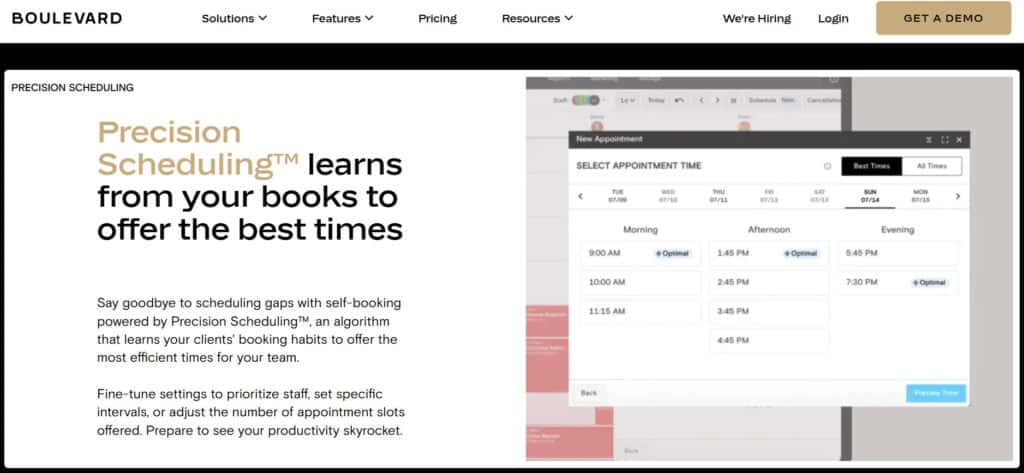
While it had everything I needed, it was difficult to find anything, not least of which because all the font was in CAPS and the structure looked like the inner workings of a dot matrix printer.
So, if user interface is important for you (especially if you have staff members under 60), here’s how the alternatives stack up:
- Mindbody: The interface here is structurally very similar to Zenoti’s, with your menu options along the left hand side of the screen, but you won’t find CAPS anywhere, and the font is much less abrasive. Some of the fonts can be a little small, but otherwise there’s a lot of spacing in the layout, a perfectly decluttered design. When you first open the platform, you’ll notice that the home screen is a quick display of things like sales, client utilization, and more.
- Acuity: The interface for Acuity has the same professionalism as Zenoti, but not as many offerings as Mindbody. It’s perfunctory and to the point.
- Mangomint: This platform offers a lot of customizable menus so it’s really easy to book clients online and chat with clients for all staff members. Their kiosk options only work with iPad so if you have ipads, you are in luck.The interface is far removed from the outdated module of Zenoti but, be warned, it uses a lot of pastels. Like…a lot.
- Vagaro: Vagaro employs a more intuitive calendar section and a lot of wide-ranging deployment options so you don’t have to invest in new devices in order to use the very easily designed interface.
- Boulevard: Boulevard has a structure very similar to Vagaro or Mangomint, but with a slightly more intuitive design. The top header is where your main menu options are (instead of along the left hand side like the other platforms) and everything is streamlined so it’s easy to find. In fact, the things that are of particular importance stand out with judiciously used pops of color like a purple background for the “new appointment” button.
Overall, it’s a toss-up for me between Boulevard, Vagaro, and Mindbody. I wouldn’t go with Acuity if the outdated and clunky interface of Zenoti was your main pain point.
#3: Reports
Being able to generate reports or quick summaries of how your business is doing is essential for any company. I will say that Zenoti has a lot of options when it comes to generating reports especially for those who need to whittle the data down based on location and subsequently granular performance metrics.
However, it was a big problem for us because it generated too much data, including things we didn’t need or care about. Moreover, the reports looked like amalgamations of the worst Excel spreadsheets you’ve ever seen and a Bloomberg terminal.
So, if you don’t have the drive of a day trader or the money to hire a marketing analyst, here are some alternatives:
- Acuity: Acuity lets you generate straightforward reports for things like subscriptions, gift certificates, packages, appointments, and revenue.
- Mangomint: Mangomint lets you customize your reports for payroll in particular. You can generate reports on things like sales and inventory, but their software focuses on payroll reports.
- Vagaro: Vagaro gives you a dashboard where you can look at quick reports and you can rearrange the layout of your reports from your app or your web browser. If you prefer your data in the form of charts and graphs with bright colors, Vagaro is it.
- Boulevard: Boulevard gives you a lot of options for creating reports on things like: Product sales, Service sales, Staff performance, Referral sources, Subscriptions, or Daily summaries. You can filter the reports based on the date and all the information you want to see, and it gives you a pretty clear breakdown of important data without looking like the Excel spreadsheet it basically is.
- Mindbody: I really like that you have an initial snapshot of Sales, Clients you have service, Utilization, Schedule, and Clients who are at risk. The layout is a clean, simple one with links to bigger reports like a full sales report instead of just the sales snippet.
If your goal is only to look at how certain packages and subscriptions are affecting your business, Acuity is there for you.
However, I really like Mindbody for independent contractors, instructors, or teachers who might be renting a small space and trying to manage things like weekly yoga classes. When you log in as the business owner, you are met with an initial dashboard that is pretty clean. There isn’t so much data that it takes your breath away (and not in a meet-cute sort of way) but it still provides you with all of the key metrics you might need at a glance.
Boulevard provides the most in-depth metrics in a format that’s not overwhelming.
Boulevard
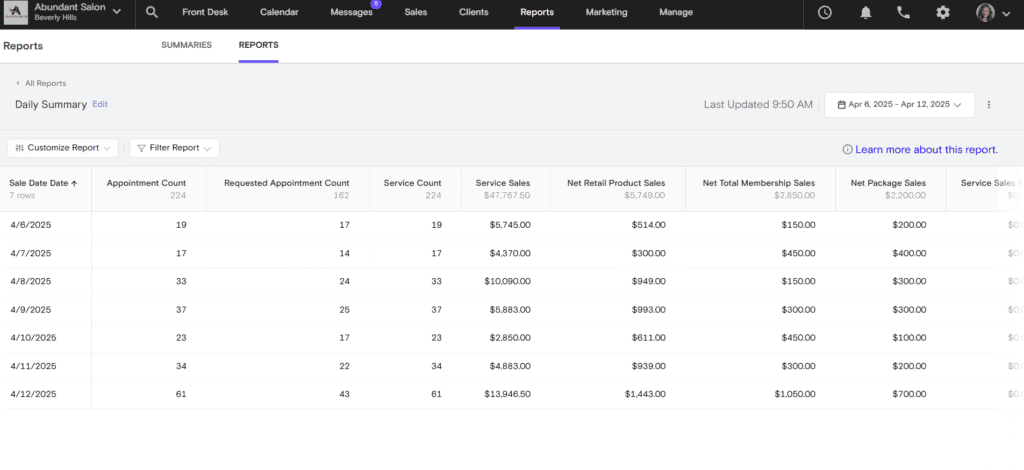
Vagaro

Mindbody
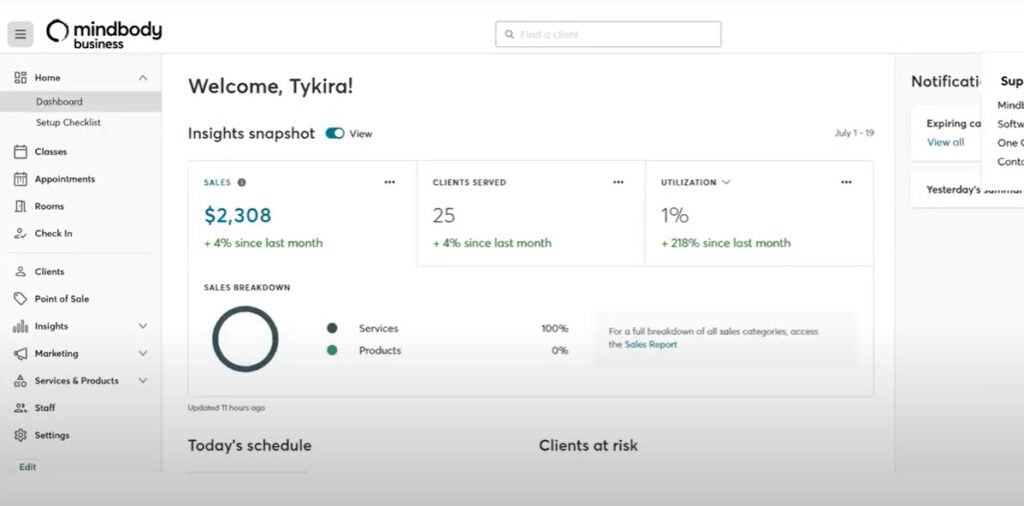
#4: Onboarding
Making the switch to new software takes a big commitment and it’s imperative that your business understand exactly how all of the functions and features work as soon as it’s deployed.
For my team, Zenoti was very thorough, but sitting through the dozens of hours of training videos reminded me once more of the ’90s, sitting through hotel room conferences with speakers who continued to stare at their notes with projector-sized glasses, delivering in a nap-inducing monotone.
Also, because their program offers so much and most of it unnecessary for small to medium sized businesses, you end up sitting through a lot of training videos that don’t offer a lot for your company. So, if onboarding is a problem for you and you’re looking for something more succinct or at least more enjoyable, consider these alternatives:
- Mindbody: Mindbody has a library of online training videos for the onboarding process but they don’t show you any screenshots of the software. Instead you get a lot of PowerPoint presentations led by someone who is all but trying to convince you to invest in a timeshare. That aside, they do really well with their interactive, self-paced onboarding feature where you can look at the checklist of onboarding tasks and make your way through those items in real time while following the self-paced guidelines.
- Vagaro: Vagaro is thorough about onboarding, and I mean thorough. However you and your team learn best, there is an onboarding option for you including videos, in person training, step by step guidelines, articles, customer service reps, and live webinars.
- Mangomint: Mangomint offers a surprisingly comprehensive onboarding process, with a lot of help for almost all areas of onboarding but a little to be desired with payroll onboarding.
- Acuity: Acuity has videos and webinars but they don’t offer any live staff members or in person options.
- Boulevard: Boulevard is designed for slightly larger teams who want to rely on the software as a full-time part of their business, so they offer onboarding specialists to give you live training tailored to your company in particular spanning several weeks and dozens of hours.
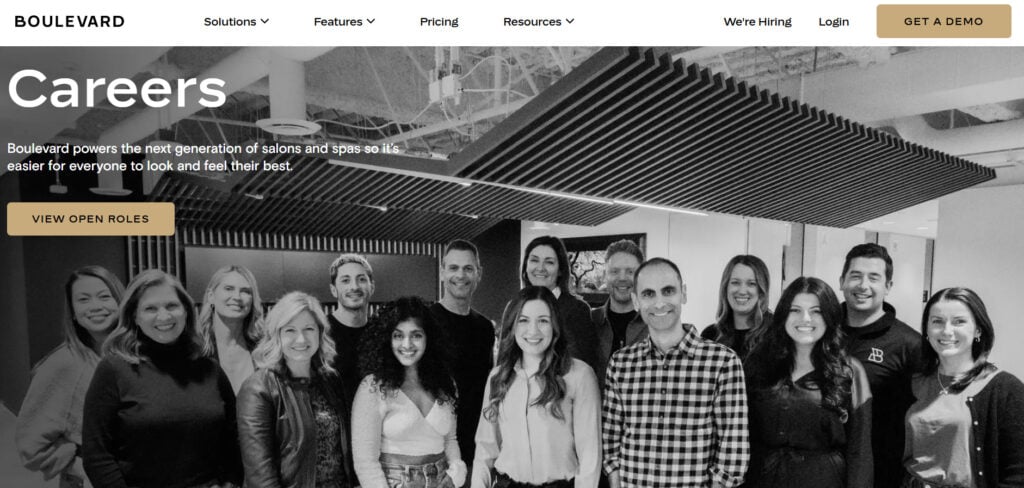
Personally, I like the pacing of Boulevard. They don’t encourage or reward rushing through the onboarding process and they help you on an individual level so that you know you haven’t made any mistakes and you can adjust the settings within the platform to your business needs. If, however, you are an independent contractor or you are renting a chair in a studio, you might prefer the self-pacing of Mindbody.
Boulevard was built for real stylists, salon, and spa owners. It handles booking, checkout, and smart scheduling the way busy salons actually work. It even handles marketing, from rebooking reminders to targeted emails and texts, plus it fills open spots with waitlist requests, without the scrambling.
Summing Up
There are a lot of good things that I can say about each of these Zenoti alternatives and, of course, the one that works best for your company is really based on the type of company you run, its size, and the type of operations.
Mindbody, for example, is great for an independent yoga instructor or personal trainer who needs a way to better market their classes. However, by and large, Boulevard is the easiest platform to use, it doesn’t have any hidden fees, you have great support from your onboarding process throughout, and it makes it really easy to manage all of your bookings, calendar functions, reports, and marketing.

